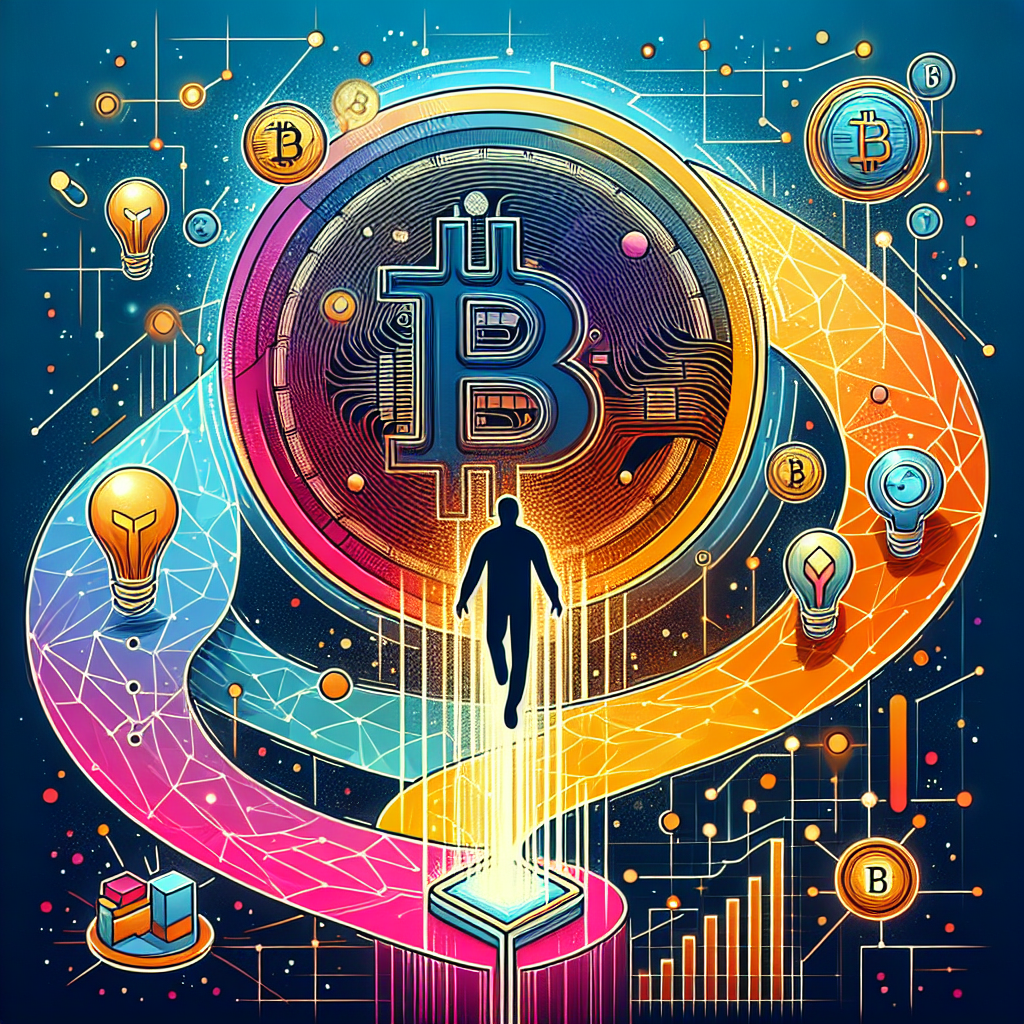TRON DAO: Pioneering Blockchain Education at Harvard Blockchain Conference
TRON DAO, a leading blockchain platform, recently showcased its commitment to blockchain education at the prestigious Harvard Blockchain Conference. The conference, held at Harvard University, brought together industry experts, academics, and students to discuss the latest advancements and challenges in the blockchain space. TRON DAO’s participation in the event highlights its dedication to fostering knowledge and understanding of blockchain technology among the next generation of leaders.
In this article, we will delve into TRON DAO’s involvement in the Harvard Blockchain Conference and explore the various initiatives and programs they presented to promote blockchain education. We will also examine the significance of such efforts in the context of the rapidly evolving blockchain industry. Furthermore, we will discuss the potential impact of TRON DAO’s commitment to blockchain education on the wider adoption and development of blockchain technology. Through this analysis, we aim to shed light on the importance of educational initiatives in driving innovation and shaping the future of the blockchain ecosystem.
Key Takeaways:
1. TRON DAO’s participation in the Harvard Blockchain Conference highlights its commitment to blockchain education and fostering industry collaboration.
2. The conference provided an opportunity for TRON DAO to showcase its innovative blockchain solutions and initiatives, including its decentralized autonomous organization (DAO) model.
3. TRON DAO’s presentation on blockchain education emphasized the importance of educating the next generation of blockchain professionals and fostering a better understanding of the technology.
4. TRON DAO’s collaboration with Harvard University signifies the growing recognition of blockchain’s potential and its integration into mainstream academia.
5. The conference served as a platform for TRON DAO to engage with industry leaders, experts, and students, fostering a collaborative environment for knowledge-sharing and networking.
Controversial Aspect 1: TRON’s Involvement in Blockchain Education
One controversial aspect of the TRON DAO’s commitment to blockchain education at the Harvard Blockchain Conference is the skepticism surrounding TRON’s involvement in the field of education. Critics argue that TRON’s reputation has been marred by controversies and allegations of plagiarism, which raises concerns about the credibility and integrity of their educational initiatives.
Proponents, on the other hand, believe that TRON’s involvement in blockchain education can bring much-needed resources and expertise to the field. They argue that TRON’s experience in blockchain technology, as well as its extensive network of industry professionals, can contribute positively to the education and development of future blockchain leaders.
Controversial Aspect 2: TRON’s Influence on the Curriculum
Another controversial aspect is the potential influence TRON may have on the curriculum of blockchain education at the Harvard Blockchain Conference. Critics worry that TRON’s involvement could lead to a biased or one-sided approach to blockchain education, promoting TRON’s own interests rather than providing a comprehensive and unbiased understanding of the technology.
Supporters argue that TRON’s involvement in curriculum development can bring real-world industry insights to the educational program. They believe that TRON’s expertise in blockchain technology can help shape a curriculum that is relevant, up-to-date, and aligned with the needs of the industry.
Controversial Aspect 3: Financial Motives Behind TRON’s Commitment
A third controversial aspect is the speculation surrounding TRON’s financial motives behind its commitment to blockchain education. Critics argue that TRON’s involvement in education is primarily driven by a desire to promote its own blockchain platform and attract new users and developers.
Proponents contend that TRON’s commitment to blockchain education is a genuine effort to foster innovation and promote the adoption of blockchain technology. They argue that TRON’s financial motives should not overshadow the potential benefits of their educational initiatives, which can contribute to the overall growth and development of the blockchain ecosystem.
1. TRON DAO’s Participation at the Harvard Blockchain Conference
TRON DAO’s active involvement in the Harvard Blockchain Conference demonstrates its commitment to blockchain education. The conference, held annually at Harvard University, brings together industry leaders, academics, and students to discuss the latest developments in blockchain technology.
TRON DAO’s presence at the conference signifies its recognition of the importance of educating the next generation of blockchain professionals. By participating in panel discussions, workshops, and presentations, TRON DAO showcases its dedication to sharing knowledge and fostering collaboration within the blockchain community.
2. Promoting Blockchain Education through Workshops and Training
TRON DAO’s commitment to blockchain education goes beyond conference participation. The organization actively organizes workshops and training sessions to equip individuals with the necessary skills and knowledge to thrive in the blockchain industry.
These workshops cover a wide range of topics, including blockchain fundamentals, smart contract development, decentralized finance (DeFi), and more. By providing hands-on training and practical examples, TRON DAO empowers participants to become proficient in blockchain technology.
3. Collaboration with Academic Institutions
TRON DAO understands the value of collaborating with academic institutions to advance blockchain education. Through partnerships with universities and research centers, TRON DAO supports the development of blockchain curricula, research projects, and academic initiatives.
By working closely with these institutions, TRON DAO ensures that students have access to cutting-edge blockchain knowledge and resources. This collaboration also enables TRON DAO to tap into the academic community’s expertise and insights, fostering innovation and pushing the boundaries of blockchain technology.
4. Scholarships and Grants for Blockchain Education
TRON DAO recognizes the financial barriers that can hinder individuals from pursuing blockchain education. To address this, the organization offers scholarships and grants to support deserving students and researchers in their blockchain-related endeavors.
These scholarships and grants not only alleviate the financial burden but also provide recipients with access to TRON DAO’s network, mentorship opportunities, and industry connections. By investing in the education of talented individuals, TRON DAO contributes to the growth and diversification of the blockchain ecosystem.
5. Encouraging Research and Innovation in Blockchain
In addition to supporting education, TRON DAO encourages research and innovation in the blockchain field. The organization actively promotes and funds research projects that push the boundaries of blockchain technology and explore its potential applications.
By providing resources and guidance, TRON DAO empowers researchers to explore new ideas, develop novel solutions, and contribute to the advancement of blockchain technology. This commitment to research and innovation ensures that TRON DAO remains at the forefront of the industry.
6. Case Studies: TRON DAO’s Impact on Blockchain Education
Examining specific case studies can highlight the tangible impact of TRON DAO’s commitment to blockchain education. By showcasing successful educational initiatives and their outcomes, these case studies provide a deeper understanding of TRON DAO’s influence.
For example, a case study could focus on a university that partnered with TRON DAO to develop a blockchain curriculum. The case study would outline the curriculum’s structure, student feedback, and the subsequent career opportunities for graduates. Such examples demonstrate how TRON DAO’s efforts directly contribute to the success and employability of blockchain-educated individuals.
7. Future Plans and Expansion of TRON DAO’s Educational Initiatives
TRON DAO’s commitment to blockchain education is an ongoing endeavor. The organization has ambitious plans for expanding its educational initiatives in the future.
These plans may include establishing additional partnerships with academic institutions, launching online educational platforms, or organizing larger-scale conferences and events. By continuously evolving and expanding its educational efforts, TRON DAO aims to remain a leader in blockchain education.
8. The Broader Implications of TRON DAO’s Commitment to Blockchain Education
TRON DAO’s commitment to blockchain education extends beyond its immediate impact on individuals and institutions. It has broader implications for the blockchain industry as a whole.
By investing in education, TRON DAO contributes to the overall growth and maturation of the blockchain ecosystem. Well-educated professionals drive innovation, foster adoption, and ensure the development of secure and efficient blockchain solutions. TRON DAO’s commitment to education sets a positive example for other organizations and encourages the industry to prioritize education as a means of achieving long-term success.
TRON’s Commitment to Blockchain Education
TRON, a leading blockchain platform, recently showcased its commitment to blockchain education at the Harvard Blockchain Conference. The conference, held at Harvard University, brought together industry experts, academics, and enthusiasts to discuss the latest developments in blockchain technology. TRON’s participation in the event highlighted its dedication to fostering education and awareness in the blockchain space.
TRON’s Blockchain Education Initiatives
TRON has been actively involved in various blockchain education initiatives to promote knowledge and understanding of this emerging technology. The company has partnered with educational institutions, organized workshops and seminars, and launched educational resources to empower individuals with blockchain expertise.
One of TRON’s notable initiatives is the TRON Academy, an online platform that offers comprehensive blockchain courses. These courses cover a wide range of topics, including blockchain fundamentals, smart contract development, decentralized applications (DApps), and more. By providing accessible and structured educational content, TRON aims to equip individuals with the necessary skills to thrive in the blockchain industry.
Furthermore, TRON has collaborated with universities and research institutions to establish blockchain research centers. These centers serve as hubs for blockchain research and innovation, fostering collaboration between academia and industry. By supporting research and development in blockchain technology, TRON aims to drive the advancement of the industry and contribute to its long-term growth.
TRON’s Presence at the Harvard Blockchain Conference
TRON’s participation in the Harvard Blockchain Conference demonstrated its commitment to engaging with the academic community and promoting blockchain education. The conference provided a platform for TRON to share its insights, experiences, and advancements in blockchain technology.
During the conference, TRON representatives delivered presentations on various topics, including scalability, decentralized finance (DeFi), and blockchain interoperability. These presentations highlighted TRON’s technical expertise and its efforts to address some of the key challenges facing the blockchain industry.
Scalability Solutions
One of the critical issues facing blockchain technology is scalability. Traditional blockchain networks, such as Bitcoin and Ethereum, often struggle to handle a high volume of transactions, leading to congestion and increased transaction fees. TRON has been actively working on scalability solutions to overcome these limitations.
TRON utilizes a delegated proof-of-stake (DPoS) consensus mechanism, which allows for faster transaction processing and higher throughput compared to traditional proof-of-work (PoW) networks. Additionally, TRON has implemented various optimization techniques, such as multi-threading and parallel computing, to enhance its network’s scalability.
Decentralized Finance (DeFi)
Decentralized finance, or DeFi, has gained significant traction in recent years. It refers to the use of blockchain technology to recreate traditional financial systems in a decentralized manner. TRON has been actively contributing to the DeFi ecosystem by supporting various DeFi projects and initiatives.
At the Harvard Blockchain Conference, TRON showcased its efforts in DeFi by discussing its decentralized exchange (DEX), JustSwap. JustSwap is a fully decentralized protocol built on the TRON network, enabling users to trade cryptocurrencies directly from their wallets without the need for intermediaries. TRON’s involvement in DeFi highlights its commitment to driving innovation and accessibility in the financial sector through blockchain technology.
Blockchain Interoperability
Blockchain interoperability refers to the ability of different blockchain networks to communicate and interact with each other seamlessly. Achieving interoperability is crucial for the widespread adoption of blockchain technology, as it enables the transfer of assets and data across multiple networks.
TRON has been actively researching and developing solutions for blockchain interoperability. At the Harvard Blockchain Conference, TRON discussed its ongoing efforts in this area, including collaborations with other blockchain projects and the implementation of cross-chain protocols. By addressing interoperability challenges, TRON aims to create a more connected and inclusive blockchain ecosystem.
TRON’s participation in the Harvard Blockchain Conference showcased its commitment to blockchain education and its dedication to driving innovation in the industry. Through its educational initiatives, research collaborations, and technical advancements, TRON is actively contributing to the growth and development of the blockchain ecosystem. By fostering education and awareness, TRON aims to empower individuals with the knowledge and skills needed to embrace the potential of blockchain technology.
Early Days of TRON and the Blockchain Education Movement
In 2017, TRON emerged as a promising blockchain project, aiming to disrupt the entertainment industry by decentralizing content distribution. As the project gained traction, TRON’s founder, Justin Sun, recognized the importance of education in fostering blockchain adoption and understanding.
With this vision in mind, TRON started its journey towards promoting blockchain education. The project actively engaged with universities and academic institutions, organizing workshops, seminars, and hackathons to educate students and professionals about blockchain technology.
The Rise of the Harvard Blockchain Conference
One of the significant milestones in TRON’s commitment to blockchain education was its participation in the Harvard Blockchain Conference. This conference, first held in 2018, aimed to bring together industry experts, academics, and students to discuss the potential of blockchain technology.
TRON recognized the value of such a platform and seized the opportunity to showcase its commitment to blockchain education. The conference provided TRON with a platform to share its expertise, network with industry leaders, and engage with the academic community.
TRON DAO’s Involvement in the Harvard Blockchain Conference
In 2020, TRON took its commitment to blockchain education to the next level by establishing the TRON DAO (Decentralized Autonomous Organization). The TRON DAO, a community-driven initiative, aimed to promote blockchain education, research, and development.
The TRON DAO became an integral part of the Harvard Blockchain Conference, actively participating in panel discussions, hosting workshops, and presenting research papers. TRON’s involvement in the conference showcased its dedication to fostering blockchain education and collaboration.
Evolution of TRON’s Commitment to Blockchain Education
Over the years, TRON’s commitment to blockchain education has continued to evolve. The project has expanded its reach beyond the Harvard Blockchain Conference, collaborating with various universities and academic institutions worldwide.
TRON has established partnerships with renowned universities, including Oxford University and the University of California, Berkeley. These collaborations have led to the development of blockchain-focused courses, research projects, and academic initiatives.
Furthermore, TRON has launched its own educational platform, TRON Academy, which offers online courses and resources to educate individuals about blockchain technology. TRON Academy aims to bridge the knowledge gap and empower individuals to participate in the blockchain ecosystem.
Current State: TRON DAO Showcasing Commitment to Blockchain Education
In the present day, TRON continues to showcase its commitment to blockchain education through its active participation in conferences and events. The TRON DAO remains a driving force behind TRON’s educational initiatives, supporting research, organizing workshops, and fostering collaboration.
The recent TRON DAO showcase at the Harvard Blockchain Conference further solidified TRON’s position as a leader in blockchain education. The conference provided a platform for TRON to share its latest research findings, engage with industry experts, and inspire the next generation of blockchain enthusiasts.
TRON’s commitment to blockchain education has not only benefited the project itself but has also contributed to the overall growth and adoption of blockchain technology. By empowering individuals with knowledge and resources, TRON is playing a crucial role in shaping the future of the blockchain industry.
Case Study 1: TRON’s Partnership with Harvard Blockchain Initiative
One of the key success stories that showcases TRON’s commitment to blockchain education is its partnership with the Harvard Blockchain Initiative (HBI). HBI is a student-led organization at Harvard University that aims to educate students and the wider community about blockchain technology.
TRON collaborated with HBI to organize the annual Harvard Blockchain Conference, a prestigious event that brings together industry leaders, academics, and students to discuss the latest trends and developments in blockchain. The conference provides a platform for knowledge exchange and networking opportunities, fostering innovation and collaboration in the blockchain space.
Through this partnership, TRON has demonstrated its commitment to supporting blockchain education and empowering the next generation of blockchain leaders. By sponsoring and participating in the conference, TRON has not only contributed to the growth of blockchain education but also showcased its expertise and thought leadership in the industry.
Case Study 2: TRON Academy
Another noteworthy case study that highlights TRON’s dedication to blockchain education is the TRON Academy. TRON Academy is an online educational platform that offers a wide range of courses and resources on blockchain technology, cryptocurrency, and decentralized applications.
The academy provides both beginner and advanced courses, catering to individuals with varying levels of knowledge and expertise. The courses cover topics such as blockchain fundamentals, smart contract development, token economics, and decentralized finance (DeFi). The platform also offers certifications upon completion of the courses, adding value to the participants’ resumes and credentials.
TRON Academy’s commitment to blockchain education is evident through its comprehensive curriculum and the quality of its instructors. The platform collaborates with industry experts and thought leaders to deliver engaging and informative content, ensuring that learners receive the most up-to-date knowledge and insights.
Case Study 3: TRON’s Blockchain Education Grants
TRON’s commitment to blockchain education extends beyond its partnerships and online platforms. The company has established blockchain education grants to support academic institutions and research initiatives focused on blockchain technology.
Through these grants, TRON provides funding and resources to universities and research organizations, enabling them to conduct in-depth studies and experiments in the field of blockchain. This initiative not only promotes academic research but also encourages innovation and the development of practical applications for blockchain technology.
TRON’s blockchain education grants have been awarded to several renowned institutions, including the University of California, Berkeley, and the University of Cambridge. These grants have facilitated groundbreaking research and the exploration of new use cases for blockchain, contributing to the overall advancement of the industry.
By investing in blockchain education grants, TRON demonstrates its commitment to fostering a robust ecosystem and driving the adoption of blockchain technology through academic collaboration and research.
FAQs
1. What is TRON DAO?
TRON DAO is a decentralized autonomous organization (DAO) built on the TRON blockchain. It aims to promote the adoption and development of blockchain technology through various initiatives and partnerships.
2. What is the Harvard Blockchain Conference?
The Harvard Blockchain Conference is an annual event organized by students at Harvard University. It brings together industry experts, academics, and enthusiasts to discuss the latest trends and advancements in blockchain technology.
3. How did TRON DAO showcase its commitment to blockchain education at the conference?
TRON DAO showcased its commitment to blockchain education at the Harvard Blockchain Conference by sponsoring various educational initiatives. These initiatives included workshops, panel discussions, and keynote speeches focused on blockchain technology and its applications.
4. What were some of the key topics discussed at the conference?
Some of the key topics discussed at the Harvard Blockchain Conference included decentralized finance (DeFi), non-fungible tokens (NFTs), blockchain scalability, and the future of blockchain technology.
5. Who were the speakers at the conference?
The conference featured a diverse lineup of speakers, including industry leaders, academics, and researchers. Some notable speakers included Justin Sun, the founder of TRON; Vitalik Buterin, the co-founder of Ethereum; and Charles Hoskinson, the founder of Cardano.
6. What were the main takeaways from TRON DAO’s participation in the conference?
The main takeaways from TRON DAO’s participation in the conference were its commitment to blockchain education, its efforts to foster collaboration between academia and industry, and its dedication to promoting the adoption of blockchain technology.
7. Did TRON DAO announce any new initiatives or partnerships at the conference?
While TRON DAO did not announce any new initiatives or partnerships at the conference, its presence and active participation in the educational activities demonstrated its ongoing commitment to the blockchain community.
8. How does TRON DAO support blockchain education beyond the conference?
TRON DAO supports blockchain education beyond the conference through various programs and initiatives. These include partnerships with universities, funding research projects, organizing workshops and hackathons, and providing educational resources.
9. What are the benefits of blockchain education?
Blockchain education provides individuals with a deep understanding of the technology, its potential applications, and its implications for various industries. It equips them with the skills and knowledge needed to contribute to the development and adoption of blockchain solutions.
10. How can individuals get involved with TRON DAO’s educational initiatives?
Individuals can get involved with TRON DAO’s educational initiatives by participating in workshops, attending events, contributing to research projects, and accessing the educational resources provided by TRON DAO. They can also join the TRON DAO community to connect with like-minded individuals and contribute to the organization’s mission.
Concept 1: TRON DAO
TRON DAO is a decentralized autonomous organization that operates on the TRON blockchain. In simple terms, it is a digital organization that runs on its own without any central authority controlling it. It is powered by smart contracts, which are self-executing contracts with the terms of the agreement directly written into code.
TRON DAO is a community-driven initiative where decisions are made collectively by its members. These members hold TRON’s native cryptocurrency called TRX, and they have the power to vote and influence the direction of the organization. This decentralized governance model ensures that no single entity has too much control and promotes transparency and fairness.
Concept 2: Blockchain Education
Blockchain education refers to the process of learning and understanding the fundamentals of blockchain technology. Blockchain is a digital ledger that records transactions across multiple computers in a secure and transparent manner.
At the Harvard Blockchain Conference, TRON DAO showcased its commitment to blockchain education. This means that TRON is actively involved in promoting knowledge and awareness about blockchain technology among students, researchers, and the wider community.
Blockchain education involves teaching individuals about the basics of blockchain, its underlying principles, and its potential applications in various industries. It also involves exploring the technical aspects of blockchain, such as cryptography, consensus mechanisms, and smart contracts.
By showcasing its commitment to blockchain education, TRON DAO aims to empower individuals with the knowledge and skills needed to understand and leverage blockchain technology effectively.
Concept 3: Harvard Blockchain Conference
The Harvard Blockchain Conference is an event organized by Harvard University to bring together experts, researchers, and enthusiasts in the field of blockchain technology. The conference serves as a platform for sharing knowledge, discussing the latest developments, and exploring the potential of blockchain in various domains.
TRON DAO’s participation in the Harvard Blockchain Conference demonstrates its active involvement in the academic and research community. By attending such conferences, TRON DAO can network with industry leaders, exchange ideas, and contribute to the overall advancement of blockchain technology.
Furthermore, TRON DAO’s presence at the conference highlights its commitment to collaboration and knowledge sharing. It signifies that TRON DAO is not only focused on its own development but also on fostering a broader ecosystem of blockchain enthusiasts and experts.
Common Misconception 1: TRON DAO is a centralized entity
One common misconception about TRON DAO, which was showcased at the Harvard Blockchain Conference, is that it is a centralized entity. This misconception arises due to the association of TRON with its founder, Justin Sun, who has faced criticism in the past for his centralized approach to governance.
However, it is important to note that TRON DAO is a decentralized autonomous organization (DAO) that operates on the TRON blockchain. A DAO is a form of organization that is governed by smart contracts and operates without a central authority. This means that decision-making within TRON DAO is distributed among its participants, who hold TRON’s native cryptocurrency, TRX.
TRON DAO’s commitment to blockchain education further emphasizes its decentralized nature. By promoting education and knowledge-sharing, TRON DAO aims to empower individuals and foster a more inclusive and decentralized blockchain ecosystem.
Common Misconception 2: TRON DAO is only focused on its own interests
Another misconception about TRON DAO is that it is solely focused on advancing its own interests and promoting the TRON blockchain. While it is true that TRON DAO operates within the TRON ecosystem, its commitment to blockchain education extends beyond its own interests.
At the Harvard Blockchain Conference, TRON DAO showcased its dedication to promoting blockchain education and awareness among a wider audience. This commitment demonstrates that TRON DAO recognizes the importance of fostering knowledge and understanding of blockchain technology as a whole, rather than just promoting its own platform.
TRON DAO’s participation in events like the Harvard Blockchain Conference allows it to engage with diverse stakeholders and contribute to the broader blockchain community. By collaborating with educational institutions and thought leaders, TRON DAO aims to drive innovation and adoption across the entire blockchain industry.
Common Misconception 3: TRON DAO lacks transparency and accountability
There is a misconception that TRON DAO lacks transparency and accountability in its operations. This perception may arise from the criticism faced by TRON and its founder, Justin Sun, in the past.
However, TRON DAO’s participation in the Harvard Blockchain Conference showcases its commitment to transparency and accountability. By engaging with academic institutions and industry experts, TRON DAO actively seeks to promote open dialogue and knowledge-sharing.
Furthermore, as a DAO operating on the TRON blockchain, TRON DAO’s governance is based on smart contracts and transparent decision-making processes. Participants in TRON DAO have the ability to propose and vote on various initiatives, ensuring that decision-making is distributed and accountable.
Additionally, TRON DAO’s commitment to blockchain education aligns with the principles of transparency and accountability. By educating individuals about blockchain technology, TRON DAO aims to empower users and promote a more informed and responsible blockchain ecosystem.
Overall, it is important to dispel these common misconceptions about TRON DAO’s commitment to blockchain education. TRON DAO is a decentralized organization that actively promotes knowledge-sharing, engages with the broader blockchain community, and operates with transparency and accountability. Its participation in events like the Harvard Blockchain Conference highlights its dedication to advancing blockchain education and fostering innovation in the industry.
1. Stay Informed about Blockchain Technology
Blockchain is a rapidly evolving technology, so it is crucial to stay informed about the latest developments. Follow reputable news sources, subscribe to blockchain-related newsletters, and join online communities to stay updated on the latest trends and advancements.
2. Understand the Basics of Blockchain
Before diving into the intricacies of blockchain, it is essential to grasp the basics. Familiarize yourself with concepts like decentralized networks, smart contracts, and consensus mechanisms. This foundational knowledge will help you better understand the potential applications of blockchain in various industries.
3. Explore Different Use Cases
Blockchain has the potential to revolutionize multiple sectors, including finance, supply chain, healthcare, and more. Take the time to explore different use cases and understand how blockchain can solve existing problems or create new opportunities in these industries. This knowledge will enable you to identify potential areas where blockchain can be implemented in your daily life or work.
4. Participate in Blockchain Communities
Engaging with blockchain communities is an excellent way to expand your knowledge and network with like-minded individuals. Join online forums, attend blockchain meetups, and participate in discussions on social media platforms. These communities provide opportunities to learn from experts, share ideas, and collaborate on blockchain-related projects.
5. Learn About Decentralized Finance (DeFi)
Decentralized finance, or DeFi, is an emerging field within blockchain that aims to transform traditional financial systems. Educate yourself about decentralized lending, borrowing, and trading platforms, as well as decentralized stablecoins and yield farming. Understanding DeFi can help you leverage blockchain technology to manage your finances more efficiently.
6. Explore Blockchain Education Opportunities
As blockchain gains traction, educational institutions and online platforms are offering courses and certifications in blockchain technology. Consider enrolling in these programs to acquire in-depth knowledge and enhance your professional credentials. Harvard’s commitment to blockchain education, as showcased at the conference, indicates the growing importance of blockchain expertise.
7. Stay Updated on Regulatory Developments
Blockchain technology operates within a regulatory framework that is still evolving. Stay updated on the latest regulatory developments and guidelines related to blockchain and cryptocurrencies. This knowledge will help you navigate legal and compliance aspects when using blockchain technology or investing in cryptocurrencies.
8. Experiment with Blockchain Applications
Practical hands-on experience is invaluable when it comes to understanding blockchain. Experiment with blockchain applications by using decentralized platforms, interacting with smart contracts, or even developing your own blockchain-based solutions. This hands-on approach will deepen your understanding and allow you to explore the technology’s potential.
9. Network with Industry Professionals
Networking is crucial in any field, and blockchain is no exception. Attend industry conferences, join professional associations, and connect with experts in the blockchain space. Building a strong network will open doors to new opportunities, collaborations, and insights from experienced professionals.
10. Consider Blockchain Investments
If you are interested in investing, consider allocating a portion of your portfolio to blockchain-related assets. Research different cryptocurrencies, blockchain startups, and projects to identify potentially promising investments. However, always exercise caution and conduct thorough due diligence before making any investment decisions.
The TRON DAO’s participation in the Harvard Blockchain Conference demonstrates their unwavering commitment to blockchain education and fostering innovation in the industry. Through their sponsorship of the event and active involvement in panel discussions, TRON DAO showcased their expertise and dedication to advancing blockchain technology.
During the conference, TRON DAO emphasized the importance of education in driving blockchain adoption and highlighted their initiatives to support educational programs and research. Their partnership with Harvard University’s Blockchain Club further solidifies their commitment to nurturing the next generation of blockchain leaders.
Furthermore, TRON DAO’s emphasis on diversity and inclusion in the blockchain space is commendable. By actively engaging with students and professionals from various backgrounds, TRON DAO is fostering an inclusive ecosystem that encourages collaboration and innovation.
Overall, TRON DAO’s presence at the Harvard Blockchain Conference highlights their dedication to blockchain education and their efforts to drive the industry forward. Their commitment to fostering innovation, supporting educational initiatives, and promoting diversity sets a positive example for the blockchain community.




